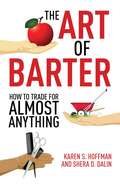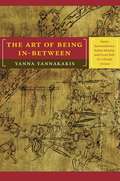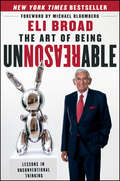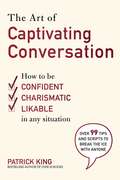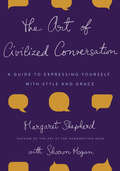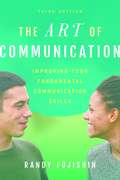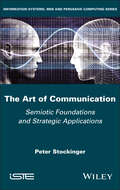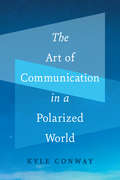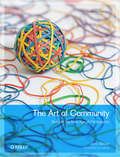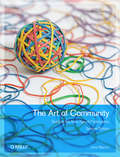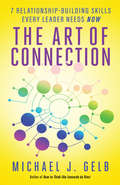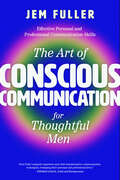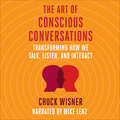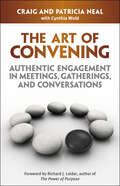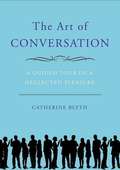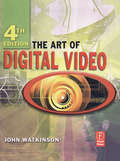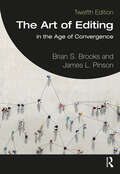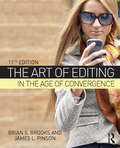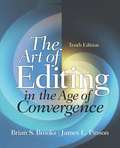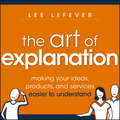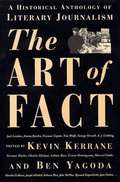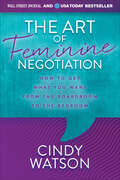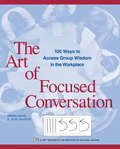- Table View
- List View
The Art of Asking: How I learned to stop worrying and let people help
by Amanda Palmer'When we really see each other, we want to help each other' - Amanda PalmerImagine standing on a box in the middle of a busy city, dressed as a white-faced bride, and silently using your eyes to ask people for money. Or touring Europe in a punk cabaret band, and finding a place to sleep each night by reaching out to strangers on Twitter. For Amanda Palmer, actions like these have gone beyond satisfying her basic needs for food and shelter - they've taught her how to turn strangers into friends, build communities, and discover her own giving impulses. And because she had learned how to ask, she was able to go to the world to ask for the money to make a new album and tour with it, and to raise over a million dollars in a month.In The Art of Asking, Palmer expands upon her popular TED talk to reveal how ordinary people, those of us without thousands of Twitter followers and adoring fans, can use these same principles in our own lives.
The Art of Asking Questions
by Stanley PayneWhile the statisticians are trying to knock a few tenths off the statistical error, says Mr. Payne, errors of tens of percents occur because of bad question wording. Mr. Payne's shrewd critique of the problems of asking questions reveals much about the nature of language and words, and a good deal about the public who must answer the poller's questions.
The Art of Barter: How to Trade for Almost Anything
by Shera Dalin Karen HoffmanJust because you don't have cash doesn't mean you don't want and need things. According to authors and business gurus Karen Hoffman and Shera Dalin, it's time to get a little creative. Most people have a skill they can use-it's just a matter of figuring out what that is and how to use it to get something else. From piano lessons in exchange for haircuts to an engine tune-up in exchange for house painting, The Art of Barter offers step-by-step instructions in: Determining your "tradable" skills Initiating a trade Figuring out a fair exchange How to close a deal Incorporating barter into everyday life In addition, the book is peppered with inspirational ideas on how to use barter in today's tough economic world.
The Art of Being In-Between: Native Intermediaries, Indian Identity, and Local Rule in Colonial Oaxaca
by Yanna YannakakisIn The Art of Being In-between Yanna Yannakakis rethinks processes of cultural change and indigenous resistance and accommodation to colonial rule through a focus on the Sierra Norte of Oaxaca, a rugged, mountainous, ethnically diverse, and overwhelmingly indigenous region of colonial Mexico. Her rich social and cultural history tells the story of the making of colonialism at the edge of empire through the eyes of native intermediary figures: indigenous governors clothed in Spanish silks, priests' assistants, interpreters, economic middlemen, legal agents, landed nobility, and "Indian conquistadors. " Through political negotiation, cultural brokerage, and the exercise of violence, these fascinating intercultural figures redefined native leadership, sparked indigenous rebellions, and helped forge an ambivalent political culture that distinguished the hinterlands from the centers of Spanish empire. Through interpretation of a wide array of historical sources--including descriptions of public rituals, accounts of indigenous rebellions, idolatry trials, legal petitions, court cases, land disputes, and indigenous pictorial histories--Yannakakis weaves together an elegant narrative that illuminates political and cultural struggles over the terms of local rule. As cultural brokers, native intermediaries at times reconciled conflicting interests, and at other times positioned themselves in opposing camps over the outcome of municipal elections, the provision of goods and labor, landholding, community ritual, the meaning of indigenous "custom" in relation to Spanish law, and representations of the past. In the process, they shaped an emergent "Indian" identity in tension with other forms of indigenous identity and a political order characterized by a persistent conflict between local autonomy and colonial control. This innovative study provides fresh insight into colonialism's disparate cultures and the making of race, ethnicity, and the colonial state and legal system in Spanish America.
The Art of Being Unreasonable: Lessons in Unconventional Thinking
by Eli BroadUnorthodox success principles from a billionaire entrepreneur and philanthropist Eli Broad's embrace of "unreasonable thinking" has helped him build two Fortune 500 companies, amass personal billions, and use his wealth to create a new approach to philanthropy. He has helped to fund scientific research institutes, K-12 education reform, and some of the world's greatest contemporary art museums. By contrast, "reasonable" people come up with all the reasons something new and different can't be done, because, after all, no one else has done it that way. This book shares the "unreasonable" principles—from negotiating to risk-taking, from investing to hiring—that have made Eli Broad such a success. Broad helped to create the Frank Gehry-designed Walt Disney Concert Hall, the Museum of Contemporary Art, the Broad Contemporary Art Museum at the Los Angeles County Museum of Art, and The Broad, a new museum being built in downtown Los Angeles His investing approach to philanthropy has led to the creation of scientific and medical research centers in the fields of genomic medicine and stem cell research At his alma mater, Michigan State University, he endowed a full-time M.B.A. program, and he and his wife have funded a new contemporary art museum on campus to serve the broader region Eli Broad is the founder of two Fortune 500 companies: KB Home and SunAmerica If you're stuck doing what reasonable people do—and not getting anywhere—let Eli Broad show you how to be unreasonable, and see how far your next endeavor can go.
The Art of Captivating Conversation: How to Be Confident, Charismatic, and Likable in Any Situation
by King PatrickThe Art of Captivating Conversation is a book for enhancing social skills and developing conversation starters—how to have a deeper connection with people, with tips based on human and social psychology as well as the author's observations and proven coaching techniques. Readers will learn the basics of what makes a good interaction, as well as a plethora of highly-actionable techniques to become more confident, charismatic, and likable.
The Art of Civilized Conversation: A Guide to Expressing Yourself With Style and Grace
by Margaret Shepherd Sharon HoganIn our fast-paced, electronic society, the most basic social interaction—talking face-to-face—can be a challenge for even the most educated and self-assured individuals. And yet making conversation is a highly practical skill: those who do it well shine at networking parties, interviews, and business lunches. Good conversation also opens doors to a happier love life, warmer friendships, and more rewarding time with family. For those intimidated by the complexity of personal interaction, or those simply looking to polish their speaking skills,The Art of Civilized Conversationis a powerful guide to communicating in an endearing way. In its pages, author Margaret Shepherd offers opening lines, graceful apologies, thoughtful questions, and, ultimately, the confidence to take conversations beyondhello. From the basics—first impressions, appropriate subject matter, and graceful exits—to finding the right words for difficult situations and an insightful discussion of body language, Shepherd uses her skilled eye and humorous anecdotes to teach readers how to turn a plain conversation into an engaging encounter. Filled with common sense and fresh insight,The Art of Civilized Conversationis the perfect inspiration not only for what to say but for how to say it with style.
The Art Of Communication: Improving Your Fundamental Communication Skills (Third Edition)
by Randy FujishinThis third edition of The Art of Communication (previously titled Creating Communication) is a brief and practical introduction to speech communication. Emphasizing face-to-face communication, yet also addressing the role of technology and its influence on daily communication, Fujishin helps you develop greater understanding of how important communication skills are in your personal and professional life--and will inspire you to use these skills in ways that enlarge and improve the lives of others as well as your own. Fujishin employs a distinctively encouraging and conversational approach as he explains the basic communication skills necessary to improve in numerous contexts--including public speaking, small group, interpersonal, intercultural, leadership, interviewing, and technology-based communication. The result is an easy-to-read book that provides the tools to implement powerful changes in the ways you interact with others.
The Art of Communication: Semiotic Foundations and Strategic Applications (ISTE Invoiced)
by Peter StockingerThe Art of Communication combines over two decades of research and teaching into a comprehensive guide on strategic communication. Grounded in the theoretical and methodological frameworks of 'situated communication' and 'communication project', this book highlights an understanding of both traditional and emerging communication practices. It particularly focuses on new genres, such as branding, design and digital communication strategies, and introduces the innovative concept of 'textscapes' – specially crafted environments to fulfill communicative objectives. This book is enriched with practical examples and is particularly relevant in multicultural and international settings, providing essential insights for adapting communication strategies to diverse cultural contexts.
The Art of Communication in a Polarized World
by Kyle ConwayPeople’s minds are hard to change. In North America and elsewhere, communities are fractured along ideological lines as social media and algorithms encourage individuals to seek out others who think like they do and to condemn those that don’t. This social and political polarization has resulted in systemic discrimination and weaponized communication trends such as gaslighting and fake news. In this compelling new book, Kyle Conway confronts the communication challenges of our modern world by navigating the space between opposing perspectives. Conway explores how individuals can come to understand another person's interpretation of the world and provides the tools for shaping effective arguments capable of altering their perspective. Drawing on the theory of cultural translation and its dimensions of power, meaning, and invention, Conway deepens our understanding of what it means to communicate and opens the door to new approaches to politics and ethics. An essential guide for surviving in our polarized society, this book offers concrete strategies for refining how values and ideas are communicated.
The Art of Community: Building the New Age of Participation (Theory in Practice)
by Jono BaconOnline communities offer a wide range of opportunities today, whether you're supporting a cause, marketing a product or service, or developing open source software. The Art of Community will help you develop the broad range of talents you need to recruit members to your community, motivate and manage them, and help them become active participants. Author Jono Bacon offers a collection of experiences and observations from his decade-long involvement in building and managing communities, including his current position as manager for Ubuntu, arguably the largest community in open source software. You'll discover how a vibrant community can provide you with a reliable support network, a valuable source of new ideas, and a powerful marketing force.The Art of Community will help you:Develop a strategy, with specific objectives and goals, for building your communityBuild simple, non-bureaucratic processes to help your community perform tasks, work together, and share successesProvide tools and infrastructure that let contributors work quicklyCreate buzz around your community to get more people involvedTrack the community's work so it can be optimized and simplifiedExplore a capable, representative governance strategy for your communityIdentify and manage conflict, including dealing with divisive personalities
The Art of Community: Building the New Age of Participation
by Jono BaconOnline communities provide a wide range of opportunities for supporting a cause, marketing a product or service, or building open source software. The Art of Community helps you recruit members, motivate them, and manage them as active participants. Author Jono Bacon offers experiences and observations from his 14-year effort to build and manage communities, including his current position as manager for Ubuntu.Discover how your community can become a reliable support network, a valuable source of new ideas, and a powerful marketing force. This expanded edition shows you how to keep community projects on track, make use of social media, and organize collaborative events. Interviews with 12 community management leaders, including Linus Torvalds, Tim O’Reilly, and Mike Shinoda, provide useful insights.Develop specific objectives and goals for building your communityBuild processes to help contributors perform tasks, work together, and share successesProvide tools and infrastructure that enable members to work quicklyCreate buzz around your community to get more people involvedHarness social media to broadcast information, collaborate, and get feedbackUse several techniques to track progress on community goalsIdentify and manage conflict, such as dealing with divisive personalities
The Art of Connection: 7 Relationship-Building Skills Every Leader Needs Now
by Michael J. GelbThese days, it’s often easier to avoid face-to-face contact in favor of technological shortcuts. But as Michael Gelb argues in this compelling, entertaining book, the meaningful relationships that come from real interaction are the key to creating innovative ideas and solving our most intractable problems. In The Art of Connection, Gelb offers readers seven methods of developing this essential rapport in their professional and personal lives. Each chapter covers specific techniques and illustrates them with memorable stories, relevant scientific research, and hands-on exercises that allow readers to apply their new skills. Most important, Gelb reminds us that developing rapport with others is not just a business tool to enhance productivity but a valuable end in itself. He guides us to cultivate the skills we all need to deepen our relationships, broaden our humanity, and transform our lives.
The Art of Conscious Communication: Effective Personal and Professional Communication Skills
by Jem Fuller&“An enlightening guide to redefining masculinity . . . helping [the modern man] navigate conversations with empathy, clarity, and respect.&” —Scott Jeffrey Miller, bestselling author and podcast host Embrace the power of conscious communication and become part of a new generation of emotionally aware, respectful men. Your journey towards enhanced relationships and a more fulfilling life begins here. In this transformative guide, author Jem Fuller draws on 20 years of coaching and leadership, providing strategies to enhance communication skills. Explore the depths of personal discovery through honest stories, discovering how small steps in awareness can lead to significant changes in relationships and results. It&’s not just a book. In a world where communication shapes the essence of our relationships and results, Fuller challenges conventional norms that may hinder effective expression. The Art of Conscious Communication for Thoughtful Men is a guide to thinking, focusing, acting, and communicating in ways that profoundly impact both individual lives and the lives of those around you. The book urges men to break free from societal constraints, offering practical strategies for navigating complex emotions and conversations. As you delve into Jem&’s colorful life experiences and leadership insights, witness the potential for positive societal change and a more fulfilling life through the profound impact of conscious communication. Inside, you&’ll find: Masterful coaching strategies for effective communication Leadership insights honed over two decades Practical guidance for navigating complex emotions Stories from a diverse life, enhancing cultural understanding If you liked books such as The First Minute, The Effective Communication Method, or 7 Winning Conflict Resolution Techniques, you&’ll love The Art of Conscious Communication for Thoughtful Men.
The Art of Conscious Conversations: Transforming How We Talk, Listen, and Interact
by Chuck WisnerRecognize the negative mental habits that derail conversations and destroy projects—and forge authentic, enduring, and productive connections. We live in conversations like fish live in water—we&’re in them all the time, so we don&’t think about them much. As a result, we can find ourselves stuck in cyclical patterns of unproductive behaviors. We listen half-heartedly, react emotionally, and respond habitually, like we&’re on autopilot. This is a practical guide for thoughtfully reflecting on conversations and avoiding the common pitfalls that cause our relationships and work to go sideways. Chuck Wisner identifies four universal types of conversations and offers specific advice to maximize the effectiveness of each:Storytelling—Investigate the stories we tell ourselves about ourselves and othersCollaborative—Explore the way our stories and other people&’s stories interactCreative—See new possibilities and discover unforeseen solutionsCommitment—Make promises we know we can keep These conversations unfold sequentially: Our awareness of our and others&’ stories transforms our ability to listen and collaborate, which opens our thoughts to creative possibilities, guiding us toward mindful agreements. Our conversations—at home, at work, or in public—can be sources of pleasure and stepping-stones toward success, or they can cause pain and lead to failure. Wisner shows how we can form a connection from the very first conversation and keep our discourse positive and productive throughout any endeavor. &“A compelling read with a big impact.&” —Susan McPherson, author of The Lost Art of Connecting
The Art of Convening: Authentic Engagement in Meetings, Gatherings, and Conversations
by Craig Neal Patricia Neal Cynthia Wold“Meetings are a waste of time” is a sentiment many of us share, which is tragic because meetings bring us together as human beings. To achieve the kind of meaning or breakthrough results most of us really yearn for when we gather, the key quality needed is authentic engagement: a genuine expression of what is true for us, and an attentive listening to what is true for others. Why it so often eludes us can be a matter of habit, distrust, lack of attention, or fear.As cofounders of Heartland Inc., Craig and Patricia Neal have led over 170 of their acclaimed Thought Leader Gatherings with leaders from over 800 diverse organizations. Their new book shares for the first time the unique and powerful Art of Convening model—developed in these gatherings and refined over six years of intensive trainings—which brings authentic engagement and meaning to any group that comes together for any purpose.Convening goes beyond facilitating. Convening creates an environment in which all voices are heard, profound exchanges take place, and transformative action results. The heart of this book is the Convening Wheel—a series of nine steps, or aspects, that bring the practices and principles needed for authentic engagement together as a whole. The book provides exercises, stories, and questions to help you master both the inner and outer dimensions of this work—because in convening, the state of the convener is equally as important as the physical preparations.Convening works in any setting and can be adapted to virtually any group process. With this book you have all the tools you need to develop this essential life and leadership skill, one that will lead to improved outcomes in your organization, community, family, and relationships.
The Art of Conversation: A Guided Tour of a Neglected Pleasure
by Catherine BlythIn The Art of Conversation, Catherine Blyth eloquently points out the sorry state of disrepair that conversation has fallen into and then, taking examples from history, literature, philosophy, anthropology, and popular culture, she gives us the tools to rebuild.
The Art of Digital Video
by John WatkinsonThe industry "bible" is back and it's better than ever. The Art of Digital Video has served as the ultimate reference guide for those working with digital video for generations. Now this classic has been revised and re-written by international consultant and industry leader John Watkinson to include important technical updates on this ever-evolving topic. The format has also been improved to include optional sections that provide additional information that you can choose to skip or investigate further, depending on your interests and comfort level with the subject. As the worlds of film, digital imaging, and computing have converged, this book has evolved to remain current and relevant, while still remaining the classic that experts in the field have trusted for years.
The Art of Editing: in the Age of Convergence
by Brian S. Brooks James L. PinsonNow in its 12th edition, this core text is the most comprehensive and widely used textbook on editing in journalism. Thoroughly revised and updated to incorporate more online and multimedia formats, this hands-on guide offers a detailed overview of the full process of journalistic editing, exploring both the "micro" aspects of the craft, such as style, spelling and grammar, and "macro" aspects, including ethics and legality. Recognizing the pronounced global shift toward online multimedia, the authors continue to stress the importance of taking the best techniques learned in print and broadcast editing and applying them to online journalism. This new edition also includes an in-depth discussion of the role editors and journalists can play in recapturing the public’s trust in the news media. Additional chapters examine how to edit for maximum visual impact and how to edit across media platforms, teaching students how to create a polished product that is grounded in the best practices of journalism. The Art of Editing, 12th edition, remains an essential resource for students of journalism across all media and levels interested in editing, design and media writing, as well as for professionals seeking to refine and refresh their skill set. Accompanying online features include instructor PowerPoints and student exercises.
The Art of Editing in the Age of Convergence: In The Age Of Convergence
by Brian S. Brooks James L. PinsonThe Art of Editing in the Age of Convergence remains the most comprehensive and widely used text on editing in journalism. This latest edition continues to shift the focus toward online multimedia as more and more people get their news that way. Amid these changes, the authors continue to stress the importance of taking the best techniques learned in print and broadcast editing and applying them to online journalism. The reality is that most people now often first learn of breaking news on Facebook or Twitter, and therefore the challenge for journalists in this new media world is distinguishing the quality and dependability of their work from all the fake news and propaganda memes, now so common online. This book is designed to help serious news providers produce a product that is well-edited and grounded in the best practices of journalism.
Art of Editing, The (Subscription)
by L. Pinson James Brian S. BrooksThe Art of Editing continues to be the standard by which editing texts are judged, offering the most comprehensive and up-to-date discussion of editing available. Long viewed as the "classic" in the field of editing, The Art of Editing continues to evolve to meet the needs of today's students. In addition to a focus on traditional newspaper editing, the authors pay significant attention to the other areas in which students are increasingly finding jobs: online media, corporate magazines, broadcasting, public relations and advertising. The ninth edition of The Art of Editing details the major changes revolutionizing the media industry and prepares students to work in convergent environments, where skill in print, broadcast and online operations is essential.
The Art of Explanation
by Lee LefeverYour guide to becoming an explanation specialist.You've done the hard work. Your product or service works beautifully - but something is missing. People just don't see the big idea - and it's keeping you from being successful. Your idea has an explanation problem.The Art of Explanation is for business people, educators and influencers who want to improve their explanation skills and start solving explanation problems.Author Lee LeFever is the founder of Common Craft, a company known around the world for making complex ideas easy to understand through short animated videos. He is your guide to helping audiences fall in love with your ideas, products or services through better explanations in any medium. You will learn to: Plan: Learn explanation basics, what causes them to fail and how to diagnose explanation problems. Package: Using simple elements, create an explanation strategy that builds confidence and motivates your audience. Present: Produce remarkable explanations with visuals and media. The Art of Explanation is your invitation to become an explanation specialist and see why explanation is now a fundamental skill for professionals.
The Art of Fact: A Historical Anthology of Literary Journalism
by Kevin Kerrane Ben YagodaHistorical and international in scope, a unique anthology traces the course of literary journalism and nonfiction prose from its origins in the eighteenth century to today, from Daniel Defoe to Joseph Mitchell to Richard Ben Cramer.
The Art of Feminine Negotiation: How to Get What You Want from the Boardroom to the Bedroom
by Cindy WatsonArt of Feminine Negotiation changes the conversation about negotiation—from how it’s looked at to how it can be implemented to negotiate one’s desired life.
The Art of Focused Conversation
by R. Brian StanfieldThis book has served me so well in my new job. I can't tell you how many times I have pulled the book off the shelf to get some direction in creating my own questions. It has been a great asset in helping me have meaningful and directed conversations at a critical time in my new job. And it has saved me precious time. - Great book!?Marlene Lockwood, Group Leader, St. Helen's Hospital, Deer Park, CaliforniaCommunication within many organizations has been reduced to email, electronic file transfer, and hasty sound bytes at hurried meetings. More and more, people appear to have forgotten the value of wisdom gained by ordinary conversations.But, at different times in history, conversation has been regarded as an art form - a crucial component of human relations. Conversation has the power to solve a problem, heal a wound, generate commitment, bond a team, generate new options, or build a vision. Conversations can shift working patterns, build friendships, create focus and energy, cement resolve.The Art of Focused Conversation convincingly restores this most human of attributes to prime place within businesses and organizations, and demonstrates what can be accomplished through the medium of focused conversation. The first Part describes the theory and background of the conversation method, which has been effectively used for group consensus making in: 1) problem solving; 2) troubleshooting; 3) coaching; 4) research and 5) interpretation of data. It also discusses how to prepare a conversation, how to lead a conversation, and what the common mistakes are. Part two then provides 100 sample conversations designed for use in many different situations, including: 1) reviewing and evaluating; 2) preparation and planning; 3) coaching, and mentoring; 4) data and media interpretation; 5) decision making; 6) managing and supervising; and 7) personal reflection and group celebrations.Developed, tested, and extensively used by professionals in the field of organizational development, The Art of Focused Conversation is an invaluable resource for all those working to improve communications in firms and organizations."This book is absolutely fabulous. I started it last night, used a whole bunch of stuff


